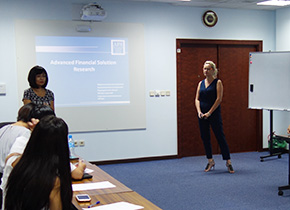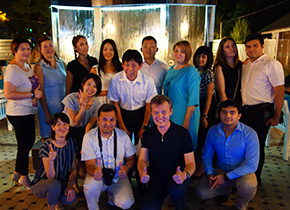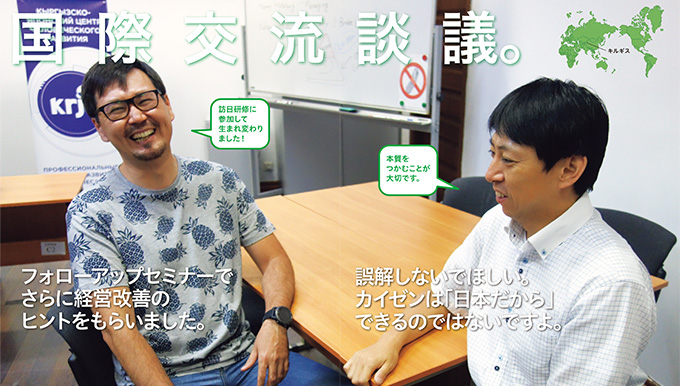The people of Japan,Thank you very much!- PREX Island
Ex-participants KAIZEN platform
Follow-up project in Uzbekistan and Kyrgyz: Ex-Participants’s voice
After returning to my country, I realized again how hugely influential the training was.
Japan gives a strong impression of having large companies, such as Toyota and Panasonic. However, I was surprised to find out that 99.7 percent in the numbers of companies are small and medium enterprises, when I went to Japan. I think that Uzbeks have much to learn from the management of Japanese small and medium enterprises. I visited lots of companies according to a variety of themes and was especially impressed with the idea of “fostering human resources”. As an employer, I have come to want our company to put stress on fostering human resources. Three companies, which I have been impressed with the most among the companies we have visited, were Gogyofuku (production and wholesale of delicacy), Kume Seni Kogyo (production and sales of domestic-produced T-shirts) and Quatro Gats (production and sales of small leather goods). I learned the importance of the effective repetition of the PDCA (plan-do-check-act) cycle at Gogyofuku, and it has been very useful for our company. I also learned that creating big hit products, and fostering products and human resources lead to the development of the company at Kume Seni Kogyo. Our company has lost some workers, whom we fostered, in the past. I would like our company to be sustainable by nurturing products and human resources. I also learned that the relationship between employees and customers has a significant influence on the sales at Quatro Gats. Applying the things I have learned from these companies to our company is a pleasure rather than being a burden. I think that a positive outcome will be seen after returning to my country. I will strive to achieve a good outcome for our company!
(Ms. Julia Bakhmatch, President of a consulting company)
- Julia conducting a presentation of her activities
- Returned Uzbek participants
I recognized the reasons why the management of the café deteriorated for the first time, when I joined the training program.
I have been running a café featuring a health conscious menu in Kyrgyz since January 2014. I studied Japanese business management in MBA course at Kyrgyz Republic-Japan Center (KRJC), and participated in the training program in Japan in 2016. What I looked forward to the most was visiting actual “sites”. I was sceptical with some contents of the lectures at the KRJC. However, I was convinced with lots of things after I witnessed the sites and heard employers’ experiences directly. To tell the truth, the second café failed, as we made a loss continuously. Eventually, I understood the reasons why it failed, after I heard the stories from various companies. I am thinking of utilizing the knowledge gained through the visits to the companies to plan and implement specific measures. Although our business belongs to the food service industry, we visited the companies of manufactural and hotel industries. Regardless of being different industries, the perspectives of the 3S (Seiri–Sort, Seiton–Set, Seisou–Shine) and fostering employees are applicable in all industries.
We have applied the advantages of each company, and put into practice the improvement of warehouse management, communication with employees and thorough financial management, after returning to my country. We have currently been looking into our employee’s pay system and promoting Kaizen (continuous improvement) for our stock management. I would be grateful if our business became a successful example of the application of Kaizen in Kyrgyz Republic, and people came to visit us from Japan and the KRJC.
(Mr. Kadyr Baimatov, Café owner)
- Inside of the café run by Mr. Mr. Kadyr Baimatov in Kyrgyz
- [left] Creating places to leave mobile phones have been helping employees not to touch them during work hours. [right] Improved ingredient storage, following the example of the companies visited in Japan.
【On the left】
I believe that the introduction of Kaizen will lead to the development of our company and its differentiation from our competitors. I have been making a strenuous effort to spread the idea of Kaizen in our company, myself being the leader, since I attended the training in 2015. However, I often feel that other employees respond and view it differently. I have to tackle not only Kaizen, but also some issues to have a good balance between the employees’ and customers’ satisfaction. “Establishing the trust relation”, which Mr. Imamura taught us, is exactly the task which we have been facing up to. I would like to continue to improve management, reminding myself of what I learned in Japan and gaining more knowledge by attending follow-up seminars like this one.
■Profile: Mr. Bolot TAALAIBEK
Deputy Chairman
Bakai Bank (medium-sized bank in Kyrgyz)
Participated in “Training for Trainers of Japan Center” in 2015
【On the right】
Participants often say to me “Kaizen can be implemented by Japanese, because they are Japanese”. But, I think that Kyrgyz and Uzbeks are not much different from Japanese. If I dare say there is a difference, in addition to the skill of Kaizen itself, Japanese have the skill to involve employees well. The combination of both skills are the secret for Kaizen to lead to success.
Furthermore, respecting employees’ spontaneity and entrusting them are vital to promote Kaizen. Entrusting them results in having mutual trust between you and your employees, and leads your employees to have enthusiasm. To do so, president’s strong decision and will to entrust them are essential. I would suggest that the training in Japan should provide not only the method, but also the opportunity to learn the way of thinking about Kaizen so that participants can arrange the Kaizen in the most suitable way for their company or country.
■Profile: Mr. Atsuyoshi Imamura
The chief consultant, Creation Co., Ltd.
Course Leader, Lecturer of many programs such as:
-Practical Business Training for Kyrgyz, Uzbekistan, Kazakhstan, Ukraine
-Mongolia-Japan Center Japanese-style Management, Training for BC Lecturers:
Mongolia
-LEP2.0 Management Training Program for Junior Officer: Malaysia
Visited Uzbekistan and Kyrgyz as a lecturer for this follow-up seminar.
- Date : August 30, 2017
- Name : Ms. Julia Bakhmatch,Mr. Kadyr Baimatov
- Seminar : the Uzbekistan and Kyrgyz Training for Trainers in 2015,the Practical Business Training for Central Asia (B) in 2016






![[left] Creating places to leave mobile phones have been helping employees not to touch them during work hours. [right] Improved ingredient storage, following the example of the companies visited in Japan.](https://www.prex-hrd.or.jp/en/wp-content/uploads/2019/02/uid000001_201710301731440b504ad5.jpg)

